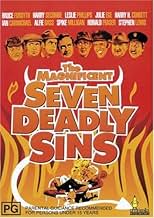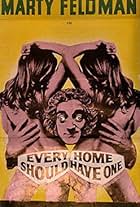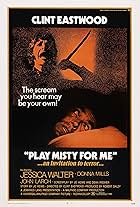This early Seventies British comedy takes us through seven short stories based on the Seven Deadly Sins. This film is a montage of different styles, from Spike Milligan's mainly silent "Slot... Read allThis early Seventies British comedy takes us through seven short stories based on the Seven Deadly Sins. This film is a montage of different styles, from Spike Milligan's mainly silent "Sloth", to the leering Harry H Corbett in "Lust".This early Seventies British comedy takes us through seven short stories based on the Seven Deadly Sins. This film is a montage of different styles, from Spike Milligan's mainly silent "Sloth", to the leering Harry H Corbett in "Lust".
Suzanne Heath
- Chloe (segment "Avarice")
- (as Susanne Heath)
Rosemarie Reede
- Woman (segment "Gluttony")
- (as Rosemarie Reed)
Storyline
Did you know
- TriviaThe segments "Pride" and "Lust" had originally been television plays in the series Comedy Playhouse (1961)
- GoofsIn the Pride section, the Rolls Royce has, at first, both the RAC and AA badges as it travels down the lane, then only one, the RAC badge, for the rest of the piece.
- Crazy creditsFelicity Devonshire tops the cast list during the end credits, but instead of receiving a written character description, she is represented by a drawing of how she appears in the film.
- ConnectionsReferences The Birth of a Nation (1915)
- SoundtracksEnvy, Greed An' Gluttony
(the Seven Deadly Sins theme)
Sung by Middle of the Road (as The Middle Of The Road)
Written by Roy Budd and Jack Fishman
Featured review
I first saw this film as a child, and it's stayed with me all these years - with its certain familiarity and a hankering for times gone by, when comedy was a lot more unsophisticated and didn't always require a great deal of intellectual engagement.
Viewing it now, all these decades later, its many flaws are apparent - and it must take a fair bit of dedication for anyone to want to sit through it!
As the title suggests, the film revolves around each of the seven deadly sins, with an individual segment for each one of around 15 mins. These are written and directed by different people, and have a different cast each time.
One bonus of this is the huge and familIar cast of the great and good of British comedy from this period in the early 70s - though perhaps not many would be recognizable outside these shores.
The comedy, such as it is though, is laboured, cheesy and sadly nearly always misses the mark.
The first two segments (starring Bruce Forsyth and Harry Secombe) are strangely compelling - despite their absurdities and daft endings.
Things take a dip though with a muddled third segment - starring the reliable Leslie Phillips in a role typically suited to his caddish and lecherous on-screen image, and surely written with him in mind.
Harry H Corbett stars in the fourth segment - it's one of the better stories here (set mostly on a tube train and tube station), but suffers from a decidedly corny ending - one that's also a bit sad too.
The fifth segment, starring Ian Carmichael and Alfie Bass is probably the best of this weak bunch. It studies class differences, and how this is tackled when a wealthy man in a Rolls-Royce meets a more humble man in a battered old jalopy head-on in a narrow country lane, with neither party willing to swallow their pride and back up to let the other car go.
After this highlight though, things fall apart with the final two segments. The first is a silent comedy starring Spike Milligan (among others) and feels very forced. It fails to raise any laughs, or even anything in the way of entertainment - and the bar hadn't exactly been set very high.
The final segment is a ludicrous story of two men who want to murder the oppressive local park keeper (played by 'On the Buses' Stephen Lewis), and this sorry and laughter-free story can't end soon enough...
All in all then, a real hotch-potch of poor comedy, and one that does its many stars a great disservice.
I guess it's worth watching these days just for its oddity value - like 'it's so bad it's good' kind of thing.
My favorite part was spotting the locations in and around Pinewood Studios, and also spotting all the many famous faces, some in quite minor or supporting roles too.
View at your peril, but be warned - 'Carry On' this is not!
Viewing it now, all these decades later, its many flaws are apparent - and it must take a fair bit of dedication for anyone to want to sit through it!
As the title suggests, the film revolves around each of the seven deadly sins, with an individual segment for each one of around 15 mins. These are written and directed by different people, and have a different cast each time.
One bonus of this is the huge and familIar cast of the great and good of British comedy from this period in the early 70s - though perhaps not many would be recognizable outside these shores.
The comedy, such as it is though, is laboured, cheesy and sadly nearly always misses the mark.
The first two segments (starring Bruce Forsyth and Harry Secombe) are strangely compelling - despite their absurdities and daft endings.
Things take a dip though with a muddled third segment - starring the reliable Leslie Phillips in a role typically suited to his caddish and lecherous on-screen image, and surely written with him in mind.
Harry H Corbett stars in the fourth segment - it's one of the better stories here (set mostly on a tube train and tube station), but suffers from a decidedly corny ending - one that's also a bit sad too.
The fifth segment, starring Ian Carmichael and Alfie Bass is probably the best of this weak bunch. It studies class differences, and how this is tackled when a wealthy man in a Rolls-Royce meets a more humble man in a battered old jalopy head-on in a narrow country lane, with neither party willing to swallow their pride and back up to let the other car go.
After this highlight though, things fall apart with the final two segments. The first is a silent comedy starring Spike Milligan (among others) and feels very forced. It fails to raise any laughs, or even anything in the way of entertainment - and the bar hadn't exactly been set very high.
The final segment is a ludicrous story of two men who want to murder the oppressive local park keeper (played by 'On the Buses' Stephen Lewis), and this sorry and laughter-free story can't end soon enough...
All in all then, a real hotch-potch of poor comedy, and one that does its many stars a great disservice.
I guess it's worth watching these days just for its oddity value - like 'it's so bad it's good' kind of thing.
My favorite part was spotting the locations in and around Pinewood Studios, and also spotting all the many famous faces, some in quite minor or supporting roles too.
View at your peril, but be warned - 'Carry On' this is not!
- How long is The Magnificent Seven Deadly Sins?Powered by Alexa
Details
- Release date
- Country of origin
- Language
- Also known as
- Die herrlichen sieben Todsünden
- Filming locations
- Production company
- See more company credits at IMDbPro
Contribute to this page
Suggest an edit or add missing content

Top Gap
By what name was The Magnificent Seven Deadly Sins (1971) officially released in Canada in English?
Answer































